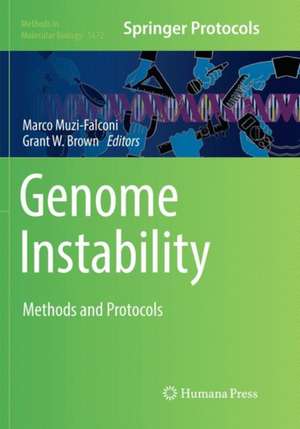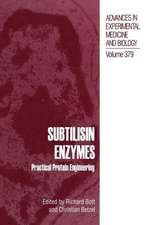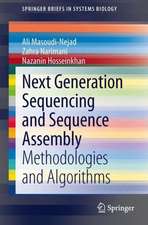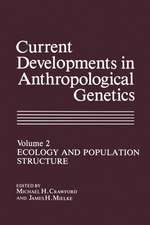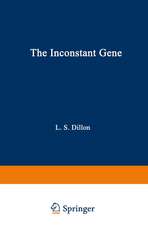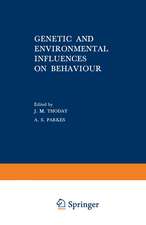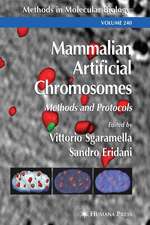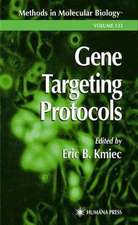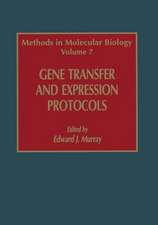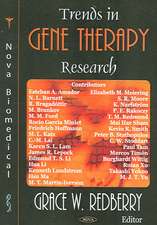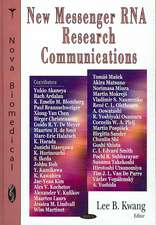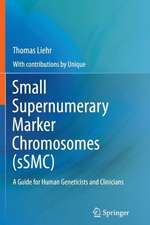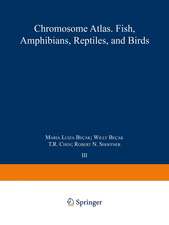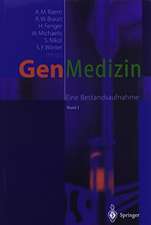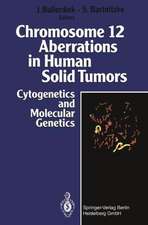Genome Instability: Methods and Protocols: Methods in Molecular Biology, cartea 1672
Editat de Marco Muzi-Falconi, Grant W Brownen Limba Engleză Paperback – 23 aug 2018
Authoritative and cutting-edge, Genome Instability: Methods and Protocols aims to provide a comprehensive resource for the discovery and analysis of the proteins and pathways that are critical for stable maintenance of the genome.
| Toate formatele și edițiile | Preț | Express |
|---|---|---|
| Paperback (1) | 1071.25 lei 38-44 zile | |
| Springer – 23 aug 2018 | 1071.25 lei 38-44 zile | |
| Hardback (1) | 1316.61 lei 6-8 săpt. | |
| Springer – 20 oct 2017 | 1316.61 lei 6-8 săpt. |
Din seria Methods in Molecular Biology
- 9%
 Preț: 791.63 lei
Preț: 791.63 lei - 23%
 Preț: 598.58 lei
Preț: 598.58 lei - 20%
 Preț: 882.98 lei
Preț: 882.98 lei -
 Preț: 252.05 lei
Preț: 252.05 lei - 5%
 Preț: 802.70 lei
Preț: 802.70 lei - 5%
 Preț: 729.61 lei
Preț: 729.61 lei - 5%
 Preț: 731.43 lei
Preț: 731.43 lei - 5%
 Preț: 741.30 lei
Preț: 741.30 lei - 5%
 Preț: 747.16 lei
Preț: 747.16 lei - 15%
 Preț: 663.45 lei
Preț: 663.45 lei - 18%
 Preț: 1025.34 lei
Preț: 1025.34 lei - 5%
 Preț: 734.57 lei
Preț: 734.57 lei - 18%
 Preț: 914.20 lei
Preț: 914.20 lei - 15%
 Preț: 664.61 lei
Preț: 664.61 lei - 15%
 Preț: 654.12 lei
Preț: 654.12 lei - 18%
 Preț: 1414.74 lei
Preț: 1414.74 lei - 5%
 Preț: 742.60 lei
Preț: 742.60 lei - 20%
 Preț: 821.65 lei
Preț: 821.65 lei - 18%
 Preț: 972.30 lei
Preț: 972.30 lei - 15%
 Preț: 660.49 lei
Preț: 660.49 lei - 5%
 Preț: 738.41 lei
Preț: 738.41 lei - 18%
 Preț: 984.92 lei
Preț: 984.92 lei - 5%
 Preț: 733.29 lei
Preț: 733.29 lei -
 Preț: 392.60 lei
Preț: 392.60 lei - 5%
 Preț: 746.26 lei
Preț: 746.26 lei - 18%
 Preț: 962.66 lei
Preț: 962.66 lei - 23%
 Preț: 860.22 lei
Preț: 860.22 lei - 15%
 Preț: 652.64 lei
Preț: 652.64 lei - 5%
 Preț: 1055.50 lei
Preț: 1055.50 lei - 23%
 Preț: 883.87 lei
Preț: 883.87 lei - 19%
 Preț: 491.89 lei
Preț: 491.89 lei - 5%
 Preț: 1038.86 lei
Preț: 1038.86 lei - 5%
 Preț: 524.16 lei
Preț: 524.16 lei - 18%
 Preț: 2122.34 lei
Preț: 2122.34 lei - 5%
 Preț: 1299.23 lei
Preț: 1299.23 lei - 5%
 Preț: 1339.12 lei
Preț: 1339.12 lei - 18%
 Preț: 1390.26 lei
Preț: 1390.26 lei - 18%
 Preț: 1395.63 lei
Preț: 1395.63 lei - 18%
 Preț: 1129.65 lei
Preț: 1129.65 lei - 18%
 Preț: 1408.26 lei
Preț: 1408.26 lei - 18%
 Preț: 1124.92 lei
Preț: 1124.92 lei - 18%
 Preț: 966.27 lei
Preț: 966.27 lei - 5%
 Preț: 1299.99 lei
Preț: 1299.99 lei - 5%
 Preț: 1108.51 lei
Preț: 1108.51 lei - 5%
 Preț: 983.76 lei
Preț: 983.76 lei - 5%
 Preț: 728.16 lei
Preț: 728.16 lei - 18%
 Preț: 1118.62 lei
Preț: 1118.62 lei - 18%
 Preț: 955.25 lei
Preț: 955.25 lei - 5%
 Preț: 1035.62 lei
Preț: 1035.62 lei - 18%
 Preț: 1400.35 lei
Preț: 1400.35 lei
Preț: 1071.25 lei
Preț vechi: 1127.64 lei
-5% Nou
Puncte Express: 1607
Preț estimativ în valută:
204.99€ • 215.55$ • 169.38£
204.99€ • 215.55$ • 169.38£
Carte tipărită la comandă
Livrare economică 12-18 aprilie
Preluare comenzi: 021 569.72.76
Specificații
ISBN-13: 9781493984473
ISBN-10: 1493984470
Pagini: 663
Ilustrații: XVI, 663 p. 133 illus., 100 illus. in color.
Dimensiuni: 178 x 254 mm
Ediția:Softcover reprint of the original 1st ed. 2018
Editura: Springer
Colecția Humana
Seria Methods in Molecular Biology
Locul publicării:New York, NY, United States
ISBN-10: 1493984470
Pagini: 663
Ilustrații: XVI, 663 p. 133 illus., 100 illus. in color.
Dimensiuni: 178 x 254 mm
Ediția:Softcover reprint of the original 1st ed. 2018
Editura: Springer
Colecția Humana
Seria Methods in Molecular Biology
Locul publicării:New York, NY, United States
Cuprins
The A-like Faker Assay for Measuring Yeast Chromosome III Stability.- The Chromosome Transmission Fidelity Assay for Measuring Chromosome Loss in Yeast.- Measuring Mutation Rates using the Luria-Delbrück Fluctuation Assay.- Molecular Genetic Characterization of Mutagenesis Using a Highly Sensitized Single-Stranded DNA Reporter System in Budding Yeast.- Analyzing Genome Rearrangements in Saccharomyces cerevisiaen: initial; background-size: initial; background-repeat: initial; background-attachment: initial; background-origin: initial; background-clip: initial;">.- High Resolution Mapping of Modified DNA Nucleobases using Excision Repair Enzymes.- Integrated Microarray-based Tools for Detection of Genomic DNA Damage and Repair Mechanisms.- Study of UV-induced DNA Repair Factor Recruitment: Kinetics and Dynamics.- Inserting Site-specific DNA Lesions into Whole Genomes.- A qPCR-based Protocol to Quantify DSB Resection.- Alkaline Denaturing Southern Blot Analysis to Monitor Double-strand Break Processing.- Single Molecule Analysis of Resection Tracks.- Mapping DNA Breaks by Next-generation Sequencing.- Genome-wide Profiling of DNA Double-strand Breaks by the BLESS and BLISS Methods.- DNA Replication Profiling using Deep Sequencing.- Quantitative Bromodeoxyuridine Immunoprecipitation Analyzed by High-Throughput Sequencing (qBrdU-seq or QBU).- Strand-specific Analysis of DNA Synthesis and ProteinsAssociation with DNA Replication Forks in Budding Yeast.- Analysis of Replicative Polymerase Usage by Ribonucleotide Incorporation.- Dynamic Architecture of Eukaryotic DNA Replication Forks in vivo, Visualized by Electron Microscopy.- A Molecular Toolbox to Engineer Site-Specific DNA Replication Perturbation.- Single Cell Gel Electrophoresis for the Detection of Genomic Ribonucleotides.- Measuring the Levels of Ribonucleotides Embedded in Genomic DNA.- Mapping Ribonucleotides Incorporated into DNA by Hydrolytic End-Sequencing.- Detection of DNA-RNA Hybrids in vivo.- Analysis of de novo Telomere Addition by Southern Blot.- Assays to Study Repair of Inducible DNA Double Strand Breaks at Telomeres.- Telomerase RNA Imaging in Budding Yeast and Human Cells by Fluorescent in situ Hybridization.- Methods to Study Repeat Fragility and Instability in Saccharomyces cerevisiae.- Quantitative Analysis of the Rates for Repeat-mediated Genome Instability in a Yeast Experimental System.- Measuring Dynamic Behaviour of Trinucleotide Repeat Tracts in vivo in Saccharomyces cerevisiae.- The Detection and Analysis of Chromosome Fragile Sites.- Imaging of DNA Ultrafine Bridges in Budding Yeast.- Detection of Ultra-Fine Anaphase Bridges.- A Chromatin Fiber Analysis Pipeline to Model DNA Synthesis and Structures in Fission Yeast.- Long-term Imaging of DNA Damage and Cell Cycle Progression in Budding Yeast Using Spinning Disk Confocal Microscopy.- The CellClamper: A Convenient Microuidic Device for Time-Lapse Imaging of Yeast.- Characterization of Structural and Configurational Properties of DNA by Atomic Force Microscopy.- Genome-wide Quantitative Fitness Analysis (QFA) of Yeast Cultures.- Rewiring the Budding Yeast Proteome using Synthetic Physical Interactions.- Reporter-based Synthetic Genetic Array Analysis: a Functional Genomics Approach for Investigating Transcript or Protein Abundance Using Fluorescent Proteins in Saccharomyces cerevisiae.- Statistical Analysis and Quality Assessment of ChIP-seq Data with DROMPA.- Quantitative Analysis of DNA Damage Signaling Responses to Chemical and Genetic Perturbations.
Textul de pe ultima copertă
This volume presents forty-two methods and protocols to analyze diverse aspects of genome instability. Chapters detail mutagenesis and repair, methods to quantify and analyze the properties of DNA double-strand breaks, profile replication, replication proteins strand-specifically, genome instability, fluorescence microscopic techniques, and genomic and proteomic approaches. Written in the highly successful Methods in Molecular Biology series format, chapters include introductions to their respective topics, lists of the necessary materials and reagents, step-by-step, readily reproducible laboratory protocols, and tips on troubleshooting and avoiding known pitfalls.
Authoritative and cutting-edge, Genome Instability: Methods and Protocols aims to provide a comprehensive resource for the discovery and analysis of the proteins and pathways that are critical for stable maintenance of the genome.
Authoritative and cutting-edge, Genome Instability: Methods and Protocols aims to provide a comprehensive resource for the discovery and analysis of the proteins and pathways that are critical for stable maintenance of the genome.
Caracteristici
Includes cutting-edge methods and protocols Provides step-by-step detail essential for reproducible results Contains key notes and implementation advice from the experts Includes supplementary material: sn.pub/extras
